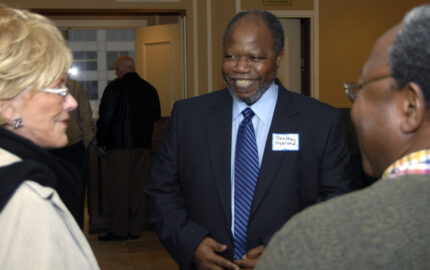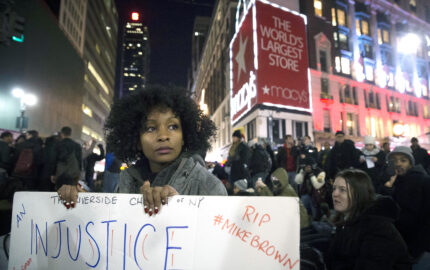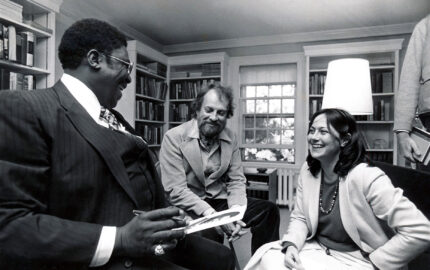In our new outreach to journalism professors and students, Nieman Reports initiated an effort to help teachers use the content of our magazine in their classrooms. To do this, we invited friends of Nieman Reports — those who contribute to its pages and those who read it — who are faculty members at college departments and graduate schools of journalism to serve as "emissaries" for Nieman Reports.
Each emissary received a welcome packet of nine magazines — two years of quarterly issues plus our special science issue — to set up a mini-library in their office, thus creating an accessible place for Nieman Reports to be found and used by other faculty and students. A three-ring binder of Table of Contents pages was also sent, and this will be updated with each issue we publish and then sent as an addition to this faculty-corridor library. Emissaries will also become a member of an e-mail list that will be notified of any online publications of sections of Nieman Reports.
We are heartened by the response this idea has received. We have 14 emissaries, six of whom are Nieman Fellows. Of course, we would welcome others among you to join us in this effort so that more professors can learn about what appears in Nieman Reports and look for ways to use its content as part of their teaching tools. If you would be willing to become an emissary for Nieman Reports, please contact us.
Nieman Reports emissaries and their schools are listed below:
Rosental Calmon Alves, Knight Center for Journalism in the Americas, University of Texas at Austin
Sharon Black, Annenberg School for Communication, University of Pennsylvania
Jim Detjen, Knight Center for Environmental Journalism, Michigan State University
John F. Greenman, Grady College of Journalism and Mass Communication, University of Georgia
Ellen Hume, Center on Media and Society, University of Massachusetts, Boston
Carolyn Johnsen, College of Journalism and Mass Communications, University of Nebraska-Lincoln
Joel Kaplan, Newhouse School of Public Communications, Syracuse University
Lynda McDonnell, Urban Journalism Workshop, University of St. Thomas
Philip Meyer, School of Journalism and Mass Communication, University of North Carolina
Gretel Schueller, Department of Journalism, State University of New York-Plattsburgh
Jeff South, School of Mass Communications, Virginia Commonwealth University
Will Sutton, Scripps Howard School of Journalism and Communications, Hampton University
Diane Winston, Annenberg School for Communication, University of Southern California
William Woo, Graduate Journalism Program, Stanford University
Each emissary received a welcome packet of nine magazines — two years of quarterly issues plus our special science issue — to set up a mini-library in their office, thus creating an accessible place for Nieman Reports to be found and used by other faculty and students. A three-ring binder of Table of Contents pages was also sent, and this will be updated with each issue we publish and then sent as an addition to this faculty-corridor library. Emissaries will also become a member of an e-mail list that will be notified of any online publications of sections of Nieman Reports.
We are heartened by the response this idea has received. We have 14 emissaries, six of whom are Nieman Fellows. Of course, we would welcome others among you to join us in this effort so that more professors can learn about what appears in Nieman Reports and look for ways to use its content as part of their teaching tools. If you would be willing to become an emissary for Nieman Reports, please contact us.
Nieman Reports emissaries and their schools are listed below:
Rosental Calmon Alves, Knight Center for Journalism in the Americas, University of Texas at Austin
Sharon Black, Annenberg School for Communication, University of Pennsylvania
Jim Detjen, Knight Center for Environmental Journalism, Michigan State University
John F. Greenman, Grady College of Journalism and Mass Communication, University of Georgia
Ellen Hume, Center on Media and Society, University of Massachusetts, Boston
Carolyn Johnsen, College of Journalism and Mass Communications, University of Nebraska-Lincoln
Joel Kaplan, Newhouse School of Public Communications, Syracuse University
Lynda McDonnell, Urban Journalism Workshop, University of St. Thomas
Philip Meyer, School of Journalism and Mass Communication, University of North Carolina
Gretel Schueller, Department of Journalism, State University of New York-Plattsburgh
Jeff South, School of Mass Communications, Virginia Commonwealth University
Will Sutton, Scripps Howard School of Journalism and Communications, Hampton University
Diane Winston, Annenberg School for Communication, University of Southern California
William Woo, Graduate Journalism Program, Stanford University



